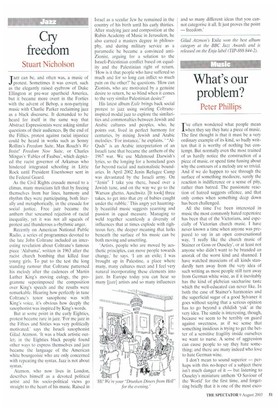Cry freedom
Stuart Nicholson
Jazz can be, and often was, a music of protest. Sometimes it was covert, such as the elegantly raised eyebrow of Duke Ellington at pre-war apartheid America, but it became more overt in the Forties with the advent of Bebop, a non-partying music with Charlie Parker reclaiming jazz as a black discourse. It demanded to be heard for itself in the same way that Abstract Expressionists were asking similar questions of their audiences. By the end of the Fifties, protest against racial injustice could be heard in works such as Sonny Rollins's Freedom Suite, Max Roach's We Insist! Freedom Now Suite, or Charles Mingus's 'Fables of Faubus', which depicted the racist governor of Arkansas who hindered integrated schooling in Little Rock until President Eisenhower sent in the Federal Guard.
As the Civil Rights crusade moved to a climax, many musicians felt that by freeing themselves from bar lines, harmony and rhythm they were participating, both literally and metaphorically, in the crusade for social justice. Free jazz became the anthem that screamed rejection of racial inequality, yet it was not all squeals of protest and thunderous a-rhythmic anger.
Recently on American National Public Radio, a series of programmes devoted to the late John Coltrane included an interesting revelation about Coltrane's famous piece 'Alabama', written in 1963 after the racist church bombing that killed four young girls. To put to the test the long standing rumour that Coltrane patterned his melody after the cadences of Martin Luther King's moving eulogy, the programme superimposed the composition over King's speech and the results were remarkable. Hearing how perfectly in tune Coltrane's tenor saxophone was with King's voice, it's obvious how deeply the saxophonist was inspired by King's words.
But at some point in the early Eighties, protest became rare in jazz. 'For me jazz in the Fifties and Sixties was very politically motivated,' says the Israeli saxophonist Gilad Atzmon. It was a black artistic outlet; in the Eighties black people found other ways to express themselves and jazz became the language of the American white bourgeoisie who are only concerned with repeating the syntax. Jazz is not about syntax.'
Atzmon. who now lives in London, describes himself as a devoted political artist and his socio-political views go straight to the heart of his music. Raised in Israel as a secular Jew he remained in the country of his birth until his early thirties. After studying jazz and composition at the Rubin Academy of Music in Jerusalem, he also earned a masters degree in philosophy, and during military service as a paramedic he became a convinced antiZionist, arguing for a solution to the Israeli-Palestinian conflict based on equality and the Palestinian right of return. 'How is it that people who have suffered so much and for so long can inflict so much pain on the other?' he questions. 'How can Zionists, who are motivated by a genuine desire to return, be so blind when it comes to the very similar Palestinian desire?'
His latest album Exile brings back social protest to jazz using swirling Coltraneinspired modal jazz to explore the similarities and commonalties between Jewish and Arabic cultures and peoples, who, he points out, lived in perfect harmony for centuries, by mixing Jewish and Arabic melodies. 'For instance,' he explains, ' "AlQuds" is an Arabic interpretation of an Israeli tune that became the anthem of the 1967 war. We use Mahmoud Darwish's lyrics, so the longing for a homeland goes far beyond racial and nationalistic boundaries. In April 2002 Jenin Refugee Camp was devastated by the Israeli army. On "Jenin" I take you there, based over a Jewish tune, and on the way we go to the Warsaw ghetto, Auschwitz. [It took] three takes, to get into that cry of babies caught under the rubble.' This angry yet hauntingly beautiful music suggests yearning and passion in equal measure. Managing to weld together seamlessly a diversity of influences that at times explode with righteous fury, the deeper meaning that lurks beneath the surface of his music can be both moving and unsettling.
'Artists, people who are moved by aesthetic principles, can move people towards change,' he says. am an exile; I was brought up in Palestine, a place where many, many cultures meet and I feel very natural incorporating these elements into jazz. In Europe today you can hear so many [jazz] artists and so many influences and so many different ideas that you cannot categorise it all. It just proves the point — freedom,' Gilad Atzmon's Exile won the best album category at the BBC Jazz Awards and is released on the Enja label (TIP-888 844-2).


































































 Previous page
Previous page